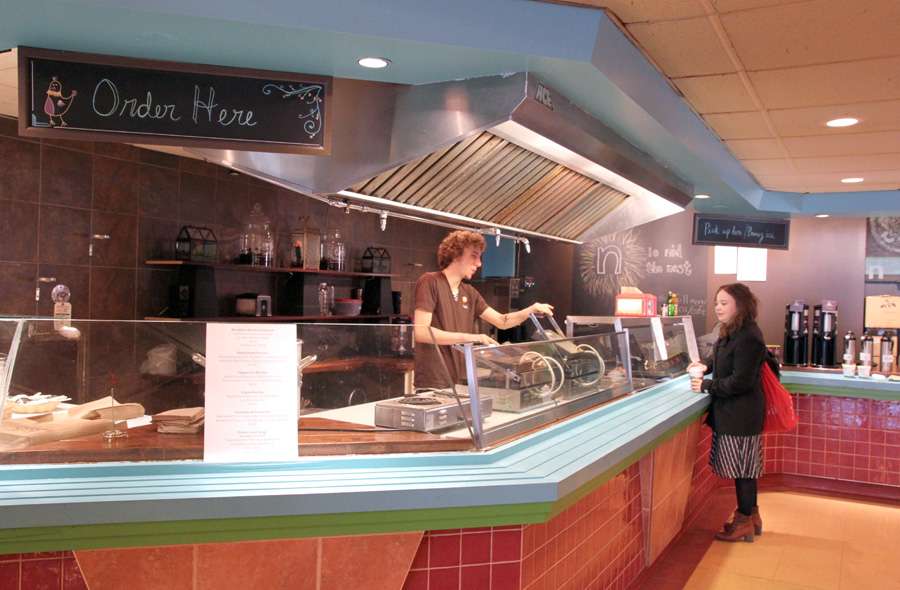After two years of planning, 3,493 burritos, and 7,824 customers, the Student-Run Cafe (SRC), “The Nest,” is wrapping up its first semester of operation. It has been an exhaustingly exhilarating experience, one that I feel very lucky and proud to have been a part of along with many other incredible students. No one tells you how hard opening a business is—not to mention a business in the food and beverage industry, under the meticulously bureaucratic structure that is the Students’ Society of McGill University (SSMU)—but we’ve been fortunate to have a team of staff members and a customer base that both inspire us to continually improve and remind us why all those late nights spent planning were worth it.
I cannot express enough gratitude or demonstrate enough humility. To every staff member that has given their time, and every customer that has given their taste buds—and money—thank you. Here, I’d like to share some of the successes, failures, and possibilities for the SRC moving forward.
One of the SRC’s biggest successes was our ability to strike a balance between quantity, quality, and price with respect to the food served. The reaction from customers in the first month was overwhelmingly about the reasonable pricing and the quality of the food. To get a homemade bowl of chili (in a vessel you could consume, no less) for $7 was something we worked really hard to achieve and maintain, and were glad to see noticed and appreciated.
Where I think the SRC fell short this semester was in its mission to be a hub for community engagement. While we did hold three engagement sessions during the Fall semester—which, I should add, only three people attended, press included—we were only able to collect feedback informally from our customer base during operation. This was incredibly useful, but still fell short of the collective decision-making model for which we were aiming. Engagement is an element of the SRC that should be addressed by both staff and SSMU executives, and I think we all underestimated the amount of time and energy required to just get schedules made and food served. While it was in fact only a take-away food service—although I would argue that a place that employed 12 students, supported seven student-run initiatives by way of affordable catering, and integrated composting services into the SSMU building embodies more than a mere lunch counter—this was one step in a direction that will continue to develop for several years.
To say that this intermediary step stifles momentum for the overall goal of bringing more student-centric space to the SSMU Building fails to appreciate or consider the way change operates within a bureaucratic structure as large and as complex as the SSMU. It would be advantageous and fruitful for the SRC and student-run spaces in general if, instead of destructively attacking the in-process efforts of individuals, the press actively engaged with and critically reflected upon the steps being taken as part of a greater picture.
Again, it seems the SRC is in a place of uncertainty. The building fee fiasco has left SSMU in a precarious position with respects to its financial sustainability, making projects like the SRC—which only recently adapted to a steep learning curve—vulnerable to reevaluation in the new funding environment. To be sure, it would be more profitable for SSMU to scrap the SRC, put in a new commercial tenant, and reap the rewards of revenue-generating real estate space, but this would be to reduce the SSMU to a society set on making money. It is my personal conviction that student societies should consider the value of their operations beyond their revenue-generating potential, but this must be echoed by the student body if it is to be realized.
What projects like the SRC need most is not more money, new equipment, or more catering events; what it needs desperately is engagement from students who care about the food they eat and the Society that serves them. The SRC has always been about more than just food; it’s meant to be a place where collaboration centralizes, and decision-making rests in the hands of the collective; where students can use the skills they’ve built in the classroom to construct and change the community they are a part of. This type of engagement does not require the physical space that the SRC currently lacks; it involves coming to the engagement sessions we hold, contributing feedback about the food and the service, and taking an active and invested role in the café’s future projects and development. The future of the SRC, like its past and present, rests in the hands of students; it can either be used and built, or lost.
Kathleen Bradley is a philosophy and economics student and is the VP Finance and Operations-elect for the 2014-2015 executive term. If you have any feedback, or would like to contribute to the SRC moving forward, you can contact her at [email protected].








